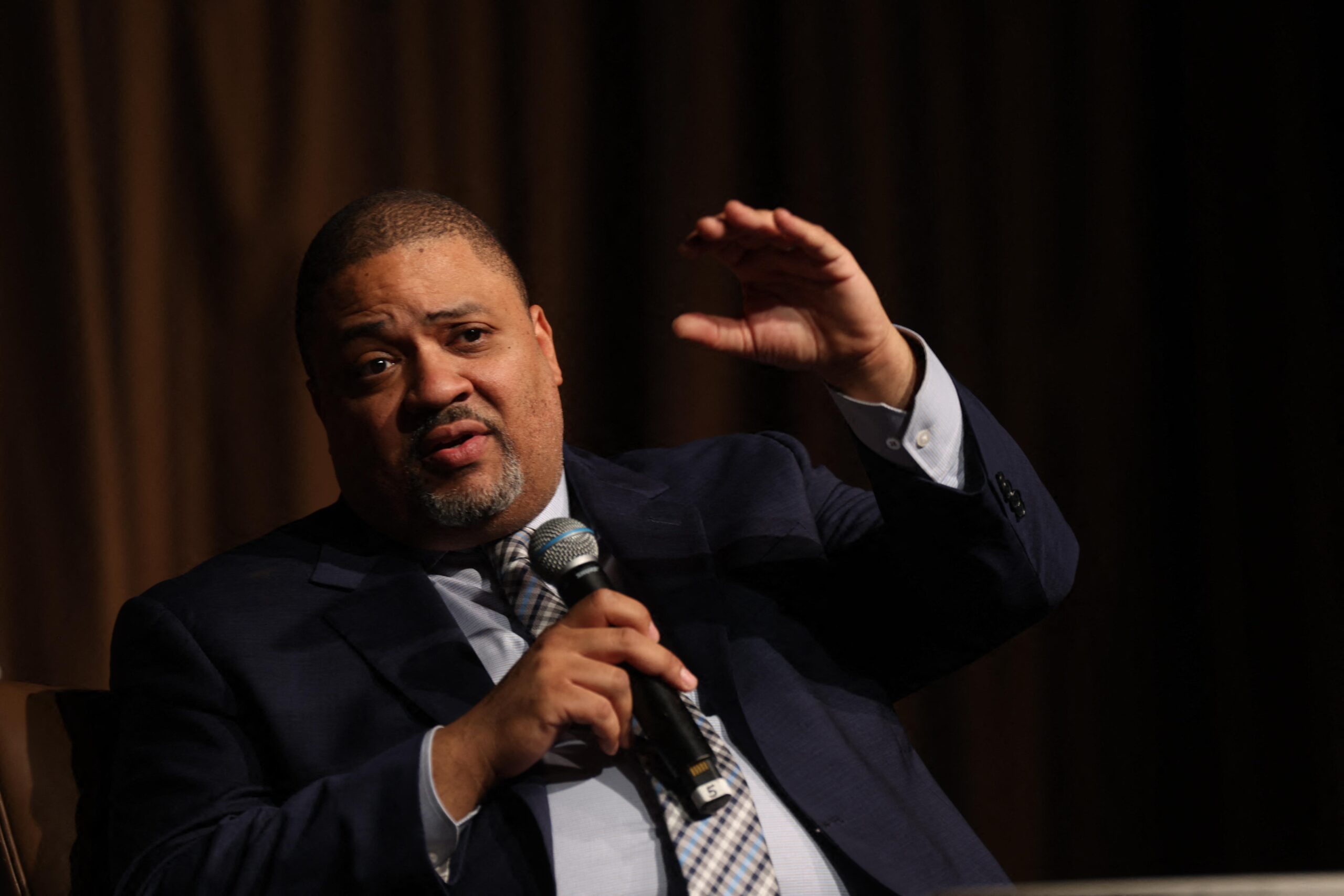Technology
Trump's Appeal of His New York Convictions Highlights the Absurdity of Alvin Bragg's Convoluted Case
Five months before the 2024 presidential election, a Manhattan jury convicted Donald Trump of falsifying business records with the intent to conceal "another crime." On Monday, the president's lawyers asked a New York appeals court to overturn those convictions, arguing that they were based on fallacious legal theories, inadequate evidence, and fragrantly deficient jury instructions.
All of those arguments are compelling. Manhattan District Attorney Alvin Bragg "concocted a purported felony by stacking time-barred misdemeanors under a convoluted legal theory," Trump's 96-page appeal brief says. "This case should never have seen the inside of a courtroom, let alone resulted in a conviction."
You need not be a Trump supporter to agree with that assessment. You only have to examine the iffy logic of Bragg's case against Trump, which transformed a single hush payment into 34 state felonies.
Prior to the 2016 presidential election, Michael Cohen, then Trump's personal lawyer, paid porn star Stormy Daniels $130,000 in exchange for a nondisclosure agreement (NDA) that barred her from talking about an alleged sexual encounter with Trump at a Las Vegas hotel in 2006. As Bragg told it, the effort to keep Daniels quiet was the essence of Trump's crime.
By depriving voters of information they might have deemed relevant in choosing between Trump and Hillary Clinton, Bragg said, Trump committed "election interference," which the D.A. described as "the heart of the case." Bragg's underlings told the same story during Trump's trial. "This was a planned, coordinated, long-running conspiracy to influence the 2016 election, to help Donald Trump get elected through illegal expenditures, to silence people who had something bad to say about his behavior," lead prosecutor Matthew Colangelo said. "It was election fraud, pure and simple."
In reality, there was nothing "pure and simple" about Bragg's case. Since trying to hide embarrassing information is not a crime, he focused on what happened after the election, when the Trump Organization reimbursed Cohen for the NDA payment with a series of checks that were recorded—inaccurately, according to Bragg—as "legal expense[s]" under a "retainer" agreement.
Bragg treated each of the 11 invoices, 11 checks, and 12 ledger entries associated with the payments to Cohen as a distinct violation of a New York law against "falsifying business records" with "intent to defraud." Trump argued that he had no such intent, since there was no evidence that he tried to deprive anyone of money, property, or "anything else of pecuniary value." His appeal reiterates that argument, saying the trial judge erred in ruling that "intent to defraud either the voting public, the government, or both" was good enough.
In any event, Trump's lawyers say, "no evidence suggested that the internal business records here—invoices, checks, and ledger entries—were intended to be seen, or had any reasonable prospect of ever being seen, by any governmental entity." Nor does it seem possible, let alone plausible, that those records, which were produced after Trump was elected, were aimed at deceiving "the voting public."
Even assuming Trump had an "intent to defraud," falsification of business records is usually a misdemeanor, meaning the statutory deadline for prosecuting it would have passed by the time Trump was indicted in April 2023, more than five years after the last payment to Cohen. Bragg avoided that obstacle by alleging that Trump's "intent to defraud" included "an intent to commit another crime or to aid or conceal the commission thereof," which turned those 34 misdemeanors into 34 felonies.
What was the other crime that Trump allegedly tried to conceal? For a year after the indictment, Bragg was vague on that point. But by the end of Trump's trial, which ran from April 15 until May 30 last year, prosecutors had settled on New York Election Law Section 17-152, an obscure, rarely used provision that makes it a misdemeanor for "two or more persons" to "conspire to promote or prevent the election of any person to a public office by unlawful means."
That theory raised another issue: What "unlawful means" did Trump and Cohen use to influence an election? Amazingly, prosecutors never offered a definitive answer to that question. Instead the jurors were instructed that they could find Trump guilty based on any of three possibilities.
The leading contender was a violation of the Federal Election Campaign Act (FECA), based on the theory that Cohen's payment to Daniels qualified as an excessive campaign contribution. Cohen had accepted that theory under a 2018 federal plea agreement that also resolved several other, unrelated charges against him. But the law on this point is hazy, and Trump was never charged with violating FECA by soliciting Cohen's "contribution." Furthermore, FECA expressly preempts state law, making it doubtful that a FECA violation could count as "unlawful means" under Section 17-152.
"By its terms, FECA squarely preempts that application of Section 17-152 to campaign contributions to candidates for federal office," Trump's lawyers say. "Were it otherwise, any district attorney in New York (or any other State) could prosecute any alleged violation of FECA by packaging it as a violation of a state law like Section 17-152, even where, as here, federal authorities declined to pursue the alleged violation."
If the jurors had doubts about the FECA theory, they were told, they could still convict Trump if they concluded that Cohen had falsified bank records when he paid Daniels. Alternatively, they could focus on the 1099-MISC forms that the Trump Organization prepared in connection with the payments to Cohen, which allegedly violated city, state, and federal tax law by misrepresenting a reimbursement as income.
That last option involved a strange sort of tax fraud, since the effect of the alleged misrepresentation was to increase Cohen's tax liability. And it was a mystery how 1099s issued after the 2016 election could have retroactively affected its outcome.
Because the prosecution offered three different theories of "unlawful means," it was not clear which one persuaded the jurors. In fact, it is possible that some jurors favored the FECA theory, some bought the bank-record argument, and others preferred the tax theory.
Those jury instructions were clearly improper, Trump's lawyers argue. "New York law requires that the jury unanimously agree on the 'unlawful means' because the object of a Section 17-152 conspiracy is an element of the offense," they say. And even if the statute is not read that way, they add, "convicting President Trump absent such unanimity" would violate his right to due process.
The appeal raises other issues, including the judge's alleged bias and the use of evidence regarding Trump's "official acts" as president. But the weak links in Bragg's case—including the conversion of a misdemeanor into a felony by reference to another misdemeanor, which in turn hinged mainly on an alleged violation of a federal election law he had no authority to enforce—would have been enough to deter any reasonably prudent and conscientious prosecutor. When you add the uncertainty about what the jury actually concluded, Trump's prospects on appeal look pretty strong.



















